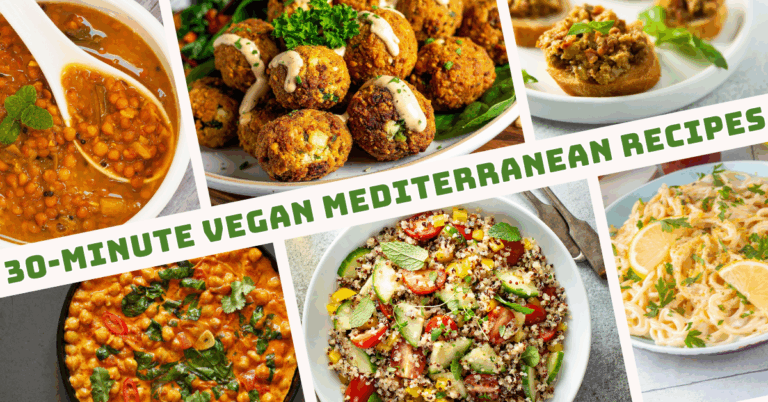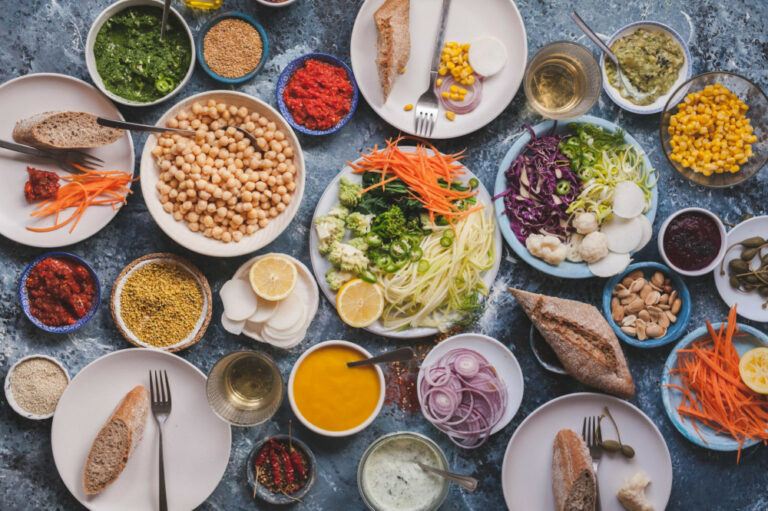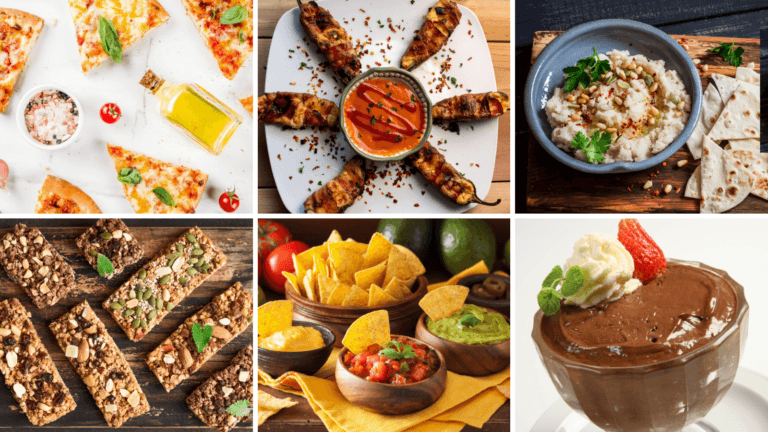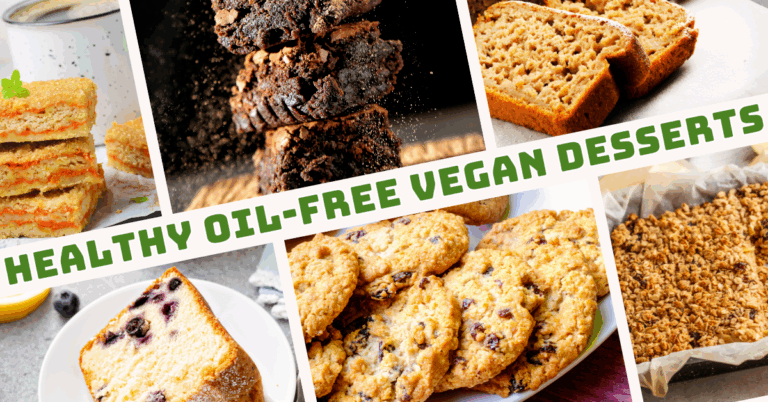Benefits Of A Vegan Diet For Athletes
Benefits Of A Vegan Diet For Athletes
There are many benefits of a vegan diet for athletes. Veganism offers more than just plant-based nutrition—it can be a game-changer for performance, recovery, and overall health.
Packed with essential vitamins, antioxidants, and lean energy sources, this lifestyle supports endurance and reduces inflammation.
A vegan diet can improve your fitness journey, regardless of your level of experience. Discover how plant-based nutrition fuels your body naturally and ethically for peak performance.
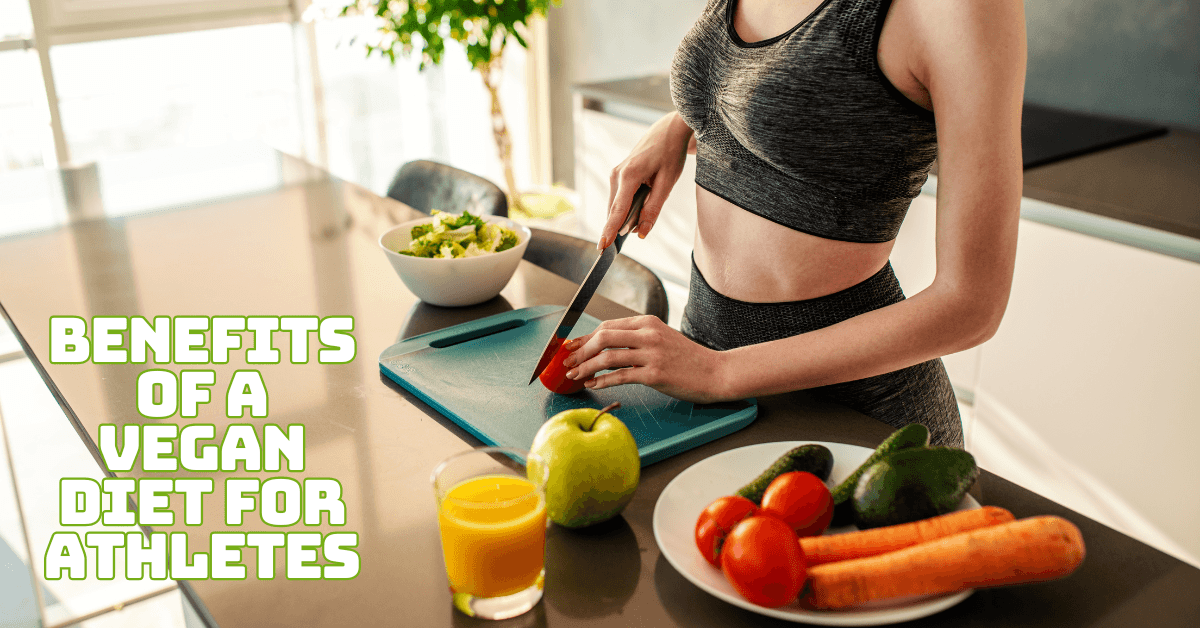
Common Myths About Veganism For Athletes
Let's take a closer look at some of the most prevalent myths surrounding veganism for athletes.
1. Myth: Vegans Are Underfed And Frequently Ill
A common misconception about plant-based diets is that they are deficient in many essential nutrients and may result in malnutrition. Evidence, however, suggests that this is untrue.
Vegan diets consistently rank higher than other diets in terms of their quality and nutritional value, according to a study published in Nutrition Reviews.
They might also have a lot of health advantages. Several studies have suggested that plant-based diets can lower the risk of developing several types of cancer, which have been reviewed in Current Nutrition Reports.
According to a recent meta-analysis published in Frontiers in Cardiovascular Medicine, they can also increase longevity and shield against cardiovascular issues. So there's no need to worry as long as you eat a well-balanced diet.
2. Myth: Vegans Cannot Consume Enough Protein
But from where do you obtain your protein? It's almost a given that you've been questioned if you're a vegan (or have thought about becoming one).
There is a widespread misconception that the only healthy protein sources are those derived from animals, but this is untrue.
Indeed, this crucial macronutrient is abundant in meat, dairy, and eggs. Still, it is also significant in beans, lentils, nuts, seeds, soy-based foods (like tofu and tempeh), spirulina, and various grains.
Some vegetables, like broccoli, asparagus, leafy greens, and sprouts, can help you meet your daily protein requirements.
3. Myth: Vegans Have Low Levels Of Energy
A typical stereotype of a vegan is that they are weak, sluggish, and dependent on naps to get through the day. While a myth, it might be accurate in some circumstances.
Balanced plant-based diets that include all essential nutrients won't cause excessive fatigue. However, you may feel less energized if you lack iodine and vitamin B12, primarily found in animal foods.
Because of this, vegans must ensure that their diet and dietary supplements contain adequate amounts of these micronutrients.
It's also important to note that many people feel worn out in the first few weeks after switching to a vegan diet. It's completely normal, and the fatigue disappears once the body adjusts to the new diet.
4. Myth: All Vegan Diets Are Beneficial For Health And Weight Loss
Is a vegan diet good for you? Plant-based diets can be very advantageous for athletes if they are correctly followed. But with so many processed vegan foods on the market today, it's pretty simple to choose the wrong thing.
You won't gain any health benefits if most of your diet consists of foods high in fats, sugars, and starchy carbohydrates. Similarly, plant-based foods typically have more dietary fiber and a lower calorie density and can be excellent for losing weight.
Even the healthiest meal plan can cause you to gain a few pounds if you consistently consume more calories than you burn.
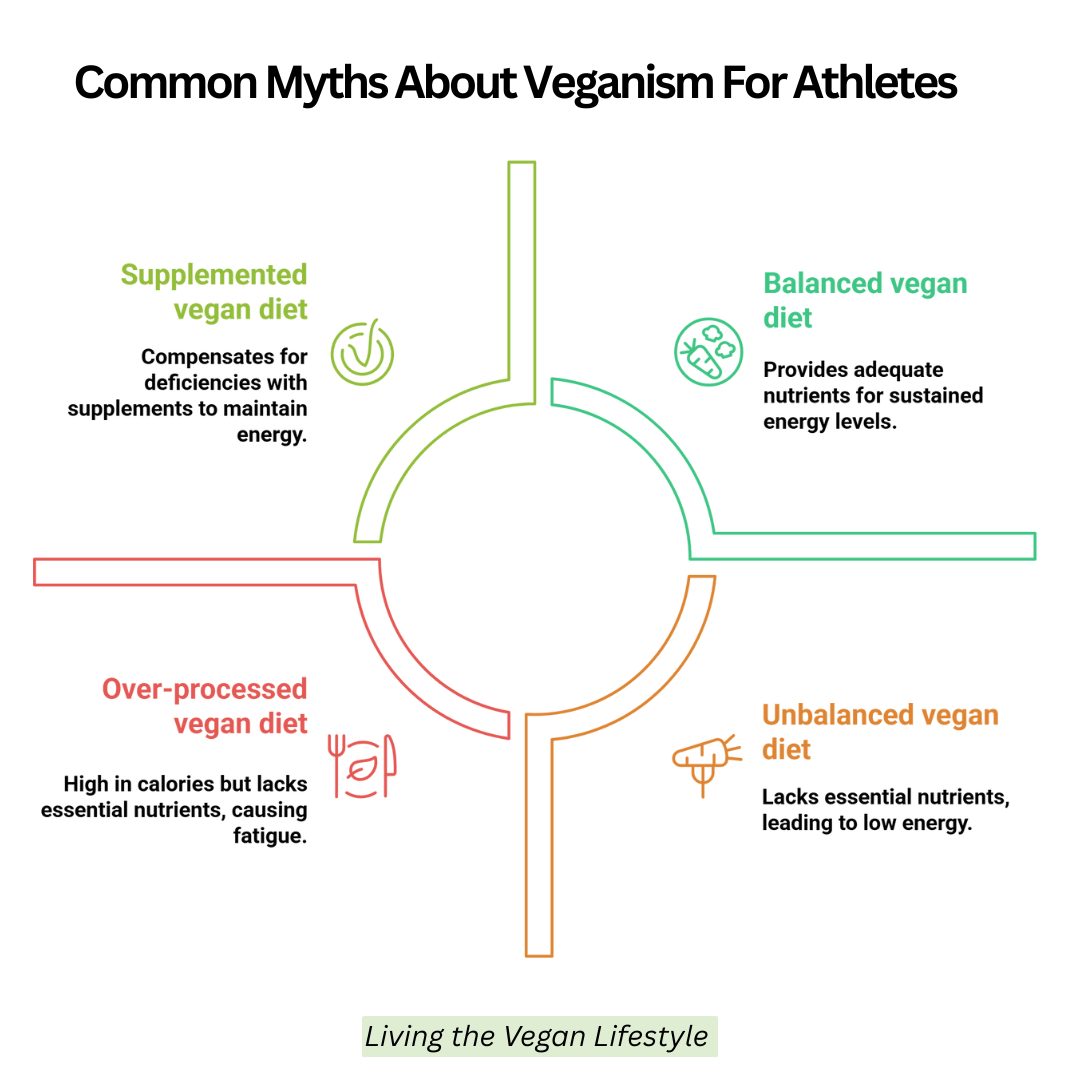
5. Myth: Vegan Diets Will Hinder Your Recovery
Every training plan must include recovery time. Your ripped and worn-out muscles are now rebuilding to become bigger and stronger. After a day or two of rest, your sore muscles should start to feel better if your body receives the proper nutrition.
Due to the high concentration of anti-inflammatory compounds found in plant foods, a well-rounded vegan diet may hasten your recovery.
Antioxidants are phytonutrients that may help lessen your muscles' burning and get you back on track more quickly. A quick recovery means more training time and better results for competitive athletes.
6. Myth: Vegans Can't Build Muscle
Many people believe that without meat, building muscle is nearly impossible. This myth is outdated and simply not true. Muscle growth depends on two key factors: consistent resistance training and adequate protein intake.
Plant-based proteins, like seitan, quinoa, lentils, tofu, and tempeh, are rich in essential amino acids needed for muscle growth and repair. Vegans who plan their meals wisely can easily meet their protein needs.
Elite athletes such as Venus Williams and strongman Patrik Baboumian thrive on vegetarian or vegan diets, showing the world that muscle and strength don’t require meat. A well-balanced vegetarian diet can absolutely support athletic performance and hypertrophy.
7. Myth: Vegans Need Supplements To Survive
It’s a common misconception that vegans need a cabinet full of supplements to stay healthy. While vitamin B12 is the only essential supplement most vegans should consider, this isn’t unique—many meat-eaters also have B12 deficiencies.
A vegetarian diet that is varied and colourful and full of whole, minimally processed foods can provide the majority of other nutrients, such as zinc, protein, calcium, iron, and omega-3 fatty acids.
With proper meal planning and variety, vegans can meet their nutritional needs without overreliance on pills or powders.
A well-rounded vegetarian diet often offers higher intakes of fiber, antioxidants, and phytochemicals than omnivorous diets.
8. Myth: Iron Deficiency Is Inevitable For Vegans
Even though heme iron from animal products is more readily absorbed than non-heme iron from plants, vegans are not always hypoxic. Iron-rich plant foods include spinach, lentils, tofu, chickpeas, quinoa, pumpkin seeds, and fortified cereals.
What’s more, consuming these foods alongside vitamin C-rich items, like citrus fruits, bell peppers, and strawberries, significantly enhances iron absorption.
Avoiding tea or coffee with iron-rich meals can also help. With mindful eating and pairing, vegans can meet and even exceed their daily iron requirements. Many plant-based eaters maintain healthy iron levels without ever needing supplements or meat.
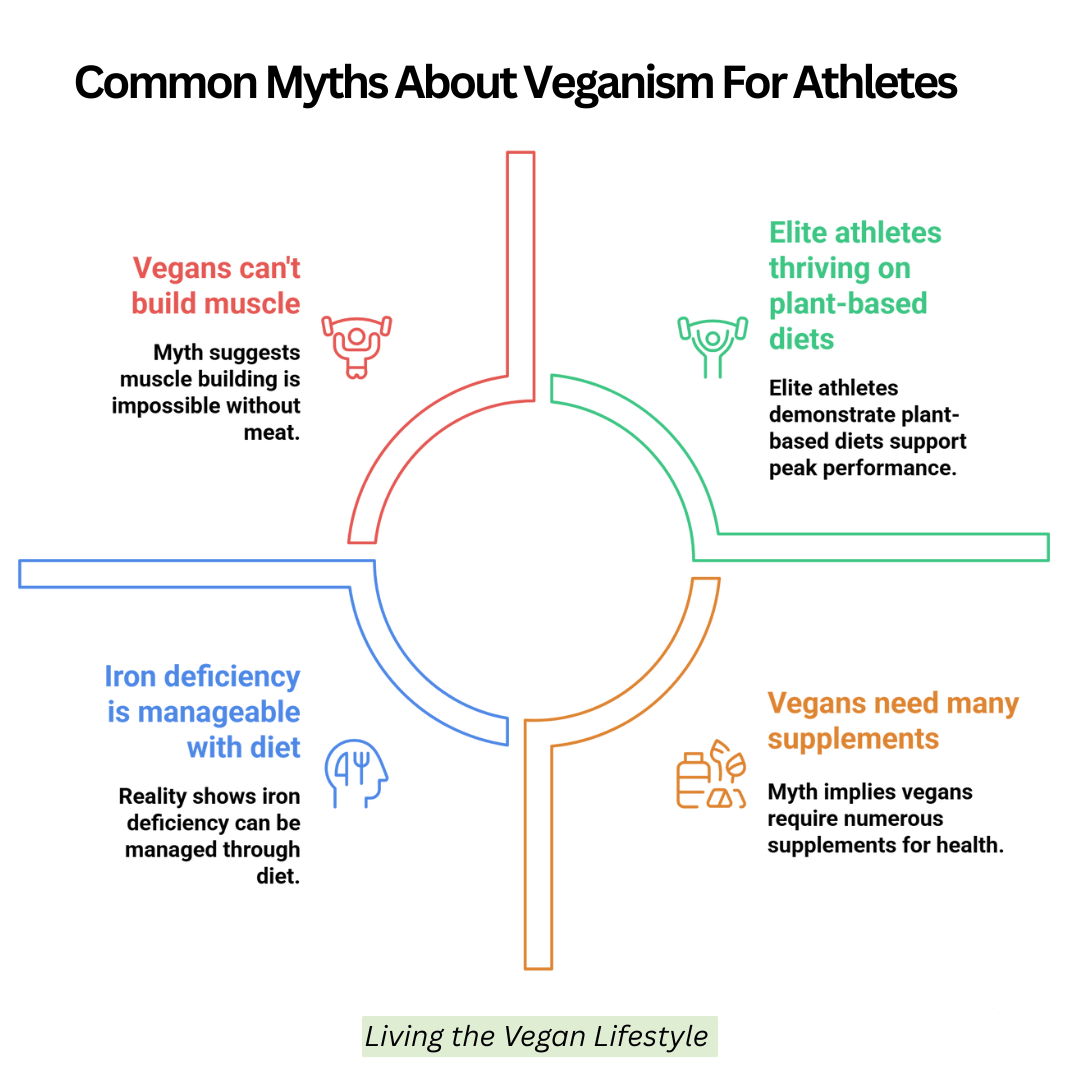
Benefits Of A Vegan Diet For Athletes
Adopting a vegan diet can be a game-changer for athletes. With its anti-inflammatory, nutrient-rich, and energy-boosting properties, plant-based eating fuels better recovery, endurance, and overall athletic performance.
1. Enhanced Recovery Time
A vegan diet significantly boosts recovery by minimizing inflammation and easing muscle soreness after workouts. Nuts, turmeric, leafy greens, berries, and other foods high in antioxidants and phytonutrients help fight oxidative stress brought on by vigorous exercise.
By accelerating tissue healing, these organic substances help athletes recover from training sessions more quickly. Reduced downtime means athletes can maintain a consistent routine, train harder, and progress more steadily without being held back by prolonged fatigue or muscle damage.
Key Features
- Anti-inflammatory compounds
- High antioxidant content
- Faster muscle repair and reduced soreness
2. Increased Energy Levels
Plant-based diets provide steady and sustainable energy through complex carbohydrates found in fruits, vegetables, legumes, and whole grains.
Unlike processed sugars that lead to energy crashes, these foods deliver a consistent fuel source that powers workouts and daily life.
Athletes on a vegan diet often experience increased endurance, greater mental focus, and reduced midday fatigue. This enhanced energy flow supports long training sessions and peak athletic performance, making it easier to stay active and motivated throughout the day.
Key Features
- High in complex carbs
- Steady blood sugar levels
- Reduced fatigue and improved stamina
3. Optimal Heart Health
A vegan diet naturally supports heart health by being free of cholesterol and low in saturated fats. It’s rich in fiber, antioxidants, and healthy plant-based fats that improve blood flow and regulate blood pressure.
These components promote enhanced cardiovascular function, which is necessary for the transport of oxygen and nutrients to muscles during physical exercise.
A healthy heart enhances endurance, supports faster recovery, and boosts overall athletic efficiency, especially in high-performance sports or endurance-based activities.
Key Features
- Low saturated fat, cholesterol-free
- High in fiber and healthy fats
- Improved circulation and cardiovascular function
4. Improved Gut Health
Vegan diets are rich in fiber, which nourishes a diverse and thriving gut microbiome. Prebiotic plant fibres, found in foods like beans, oats, and leafy greens, encourage the growth of beneficial bacteria that improve nutritional absorption and aid in digestion.
A balanced digestive system reduces bloating, strengthens immunity, and ensures that athletes absorb all the essential nutrients from their meals.
Better gut health also supports mood, focus, and overall well-being, helping athletes stay at the top of their game physically and mentally.
Key Features
- High in prebiotic fiber
- Balanced gut microbiome
- Enhanced digestion and nutrient uptake
5. Leaner Body Composition
Due to the reduced calorie density of plant-based meals, athletes who follow a vegan diet frequently find it easier to obtain a leaner body.
This allows for larger food portions that satisfy hunger without excessive calorie intake. As a result, body fat is reduced while muscle mass is preserved, leading to better speed, agility, and athletic efficiency.
Maintaining an ideal body composition enhances mobility, reduces injury risk, and contributes to more powerful and dynamic performance in any sport or fitness activity.
Key Features
- Naturally low in calories and fat
- Promotes fat loss while maintaining muscle
- Enhances agility and athleticism
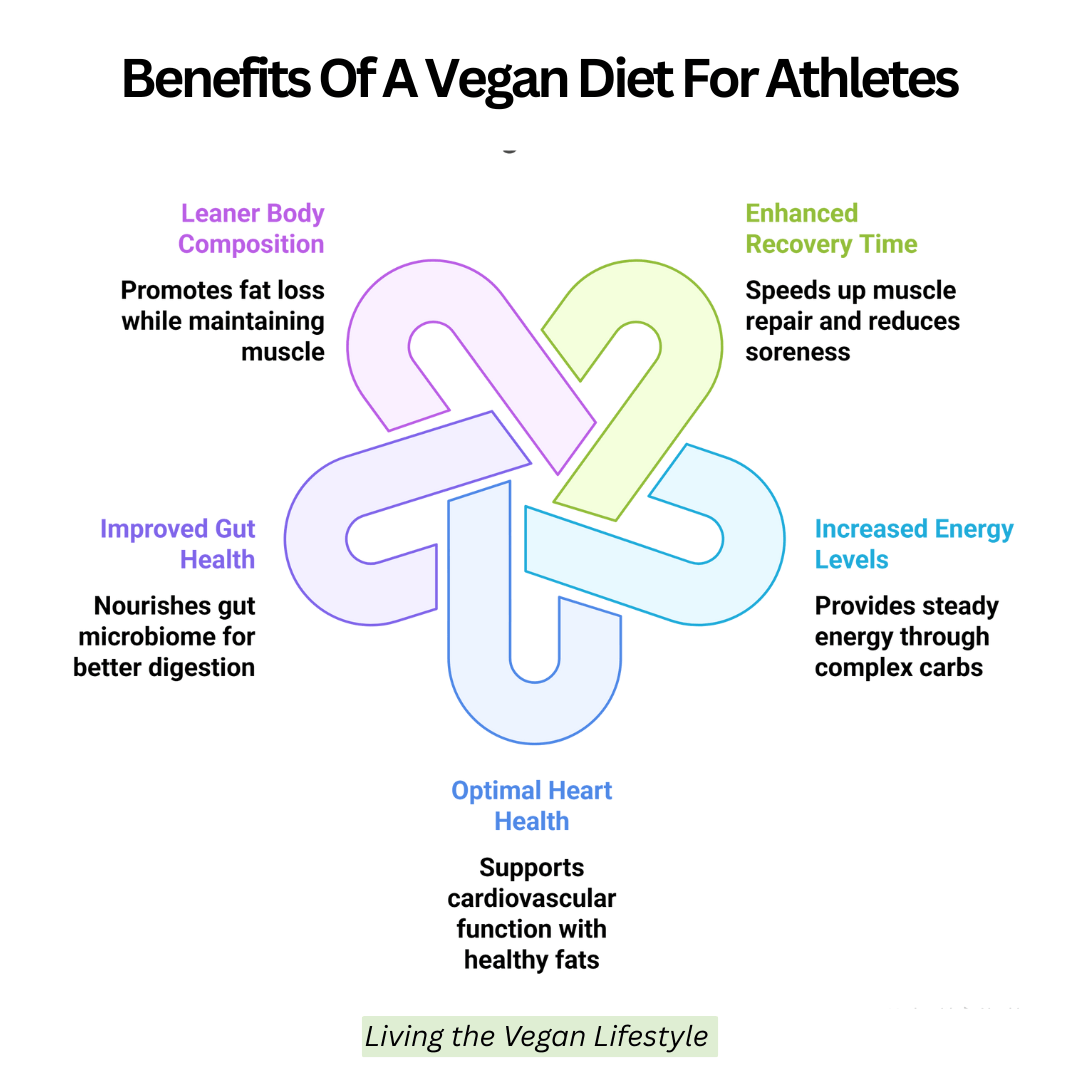
6. Reduced Inflammation
Chronic inflammation can slow recovery, increase injury risk, and hinder athletic performance. A plant-based diet packed with anti-inflammatory foods like flaxseeds, turmeric, leafy greens, and berries helps counteract these effects.
These nutrient-rich ingredients reduce oxidative stress and support quicker healing of muscles and joints. Less inflammation also means fewer flare-ups, less soreness, and better overall mobility, allowing athletes to stay consistent in their training without being sidelined by pain, fatigue, or recurring injuries linked to high inflammation levels.
Key Features
- Anti-inflammatory food sources
- Lower risk of chronic inflammation
- Supports joint and tissue repair
7. Improved Blood Flow And Oxygenation
Plant-based diets help maintain healthy blood vessels by improving endothelial function, which boosts circulation and vascular elasticity.
Leafy greens, beets, and citrus fruits are some foods that increase nitric oxide production, which enhances the flow of nutrients and oxygen to working muscles.
Foods that increase nitric oxide production include citrus fruits, beets, and leafy greens. Working muscles receive more oxygen and nutrients as a result.
Efficient blood flow aids in faster removal of metabolic waste like lactic acid, improving stamina and reducing recovery time.
This results in more powerful workouts, improved endurance, and a stronger cardiovascular system that supports peak athletic output and quicker performance rebound.
Key Features
- Supports vascular health
- Increases oxygen delivery to muscles
- Boosts endurance and recovery
8. Enhanced Hydration
Many fruits and vegetables have high water content, naturally supporting hydration levels throughout the day. Foods like cucumbers, watermelon, oranges, and spinach not only quench thirst but also supply essential electrolytes.
This helps regulate body temperature, support joint lubrication, and keep muscles functioning optimally during long workouts or competitions.
Staying well-hydrated through whole foods reduces the risk of fatigue, cramps, and overheating, giving athletes an edge in both training and competition by keeping their bodies well-balanced and energized.
Key Features
- High-water-content foods
- Promotes electrolyte balance
- Prevents dehydration-related fatigue
9. Lower Risk Of Chronic Disease
Even elite athletes can face long-term health risks such as heart disease, diabetes, and certain cancers. Rich in fiber, antioxidants, and other nutrients, a vegan diet helps lower those risks.
Whole plant foods like beans, nuts, and berries support immune health, regulate blood sugar, and fight inflammation. Maintaining long-term health allows athletes to perform consistently, train longer into their careers, and avoid setbacks from illness. Prevention today means better athletic potential and longevity in both sport and life.
Key Features
- Disease-fighting nutrients
- Promotes longevity and healthspan
- Minimizes future health risks
10. Ethical And Environmental Benefits
In addition to improving animal welfare, a vegan diet has a significant positive environmental impact by using fewer resources and emitting fewer greenhouse gases.
For many athletes, this ethical alignment fosters a more profound sense of purpose, reinforcing motivation and mental clarity.
Knowing that their diet supports both personal and planetary health can enhance mental wellness and provide a strong inner drive.
This mindset can positively influence discipline, focus, and overall satisfaction in an athlete’s lifestyle, fueling commitment to long-term goals.
Key Features
- Ethical food choices
- Reduced ecological footprint
- Mental alignment and motivation
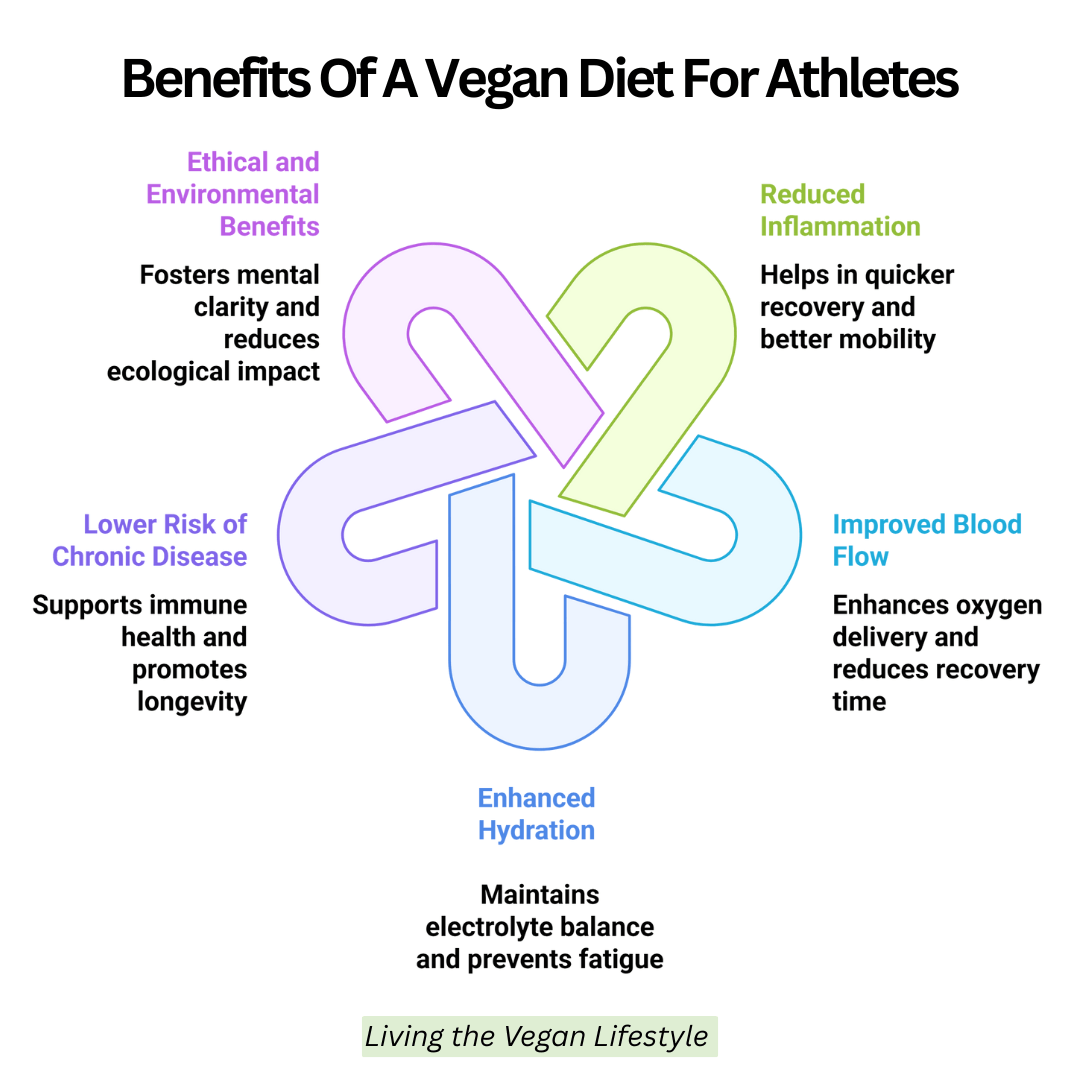
11. Easier Weight Management
Due to their increased fiber content and often lower calorie content, vegan diets help athletes feel fuller on fewer calories. This promotes natural portion control and prevents overeating while supporting muscle retention and fat loss.
Eating nutrient-dense, plant-based meals helps maintain a lean, athletic physique without extreme dieting. Easier weight management leads to better speed, flexibility, and endurance. Adopting a vegan lifestyle makes it easier for athletes who want to keep their maximum form throughout the year.
Key Features
- Low calorie density
- Promotes satiety
- Supports healthy body composition
12. Muscle Building Potential
Despite common misconceptions, a vegan diet can fully support muscle growth when it includes high-quality plant-based proteins like lentils, tofu, tempeh, seitan, and quinoa. These foods supply the essential amino acids required for both muscle growth and repair.
When combined with consistent strength training and thoughtful meal planning, vegan athletes can develop and maintain strong, lean muscle mass.
Plant proteins also come with added fiber and micronutrients, supporting overall health while fueling optimal physical development and post-workout recovery.
Key Features
- Rich in plant-based proteins
- Supports hypertrophy and muscle repair
- High amino acid diversity
13. Better Sleep Quality
Whole plant foods naturally contain nutrients that support restful, restorative sleep. Magnesium, tryptophan, and potassium—found in foods like bananas, oats, nuts, and leafy greens—help regulate the nervous system and balance the circadian rhythm.
Deep, uninterrupted sleep enhances muscle recovery, mental clarity, and overall athletic performance. With better sleep, athletes feel more energized, focused, and ready to train or compete.
A vegan diet promotes consistent sleep patterns, helping athletes maximize rest and maintain a strong mind-body connection.
Key Features
- Sleep-promoting nutrients
- Regulates circadian rhythm
- Improves rest and recovery
14. Boosted Immune System
Zinc, vitamin E & vitamin C are found in a vegan diet full of antioxidant-rich fruits, vegetables, nuts, and seeds. These elements strengthen the immune system and help the body fend off common colds, infections, and inflammation.
For athletes, this means fewer missed training days, faster bounce-back from illness, and reduced downtime from fatigue.
Maintaining a robust immune defence is essential for consistent progress and peak physical output throughout the training season and competitive calendar.
Key Features
- Immune-enhancing nutrients
- Reduces illness frequency
- Supports recovery from exertion
15. Mental Clarity And Focus
Fueling the brain with nutrient-dense, plant-based foods supports clear thinking and emotional balance. Nutrients like B vitamins, iron, and plant-based omega-3s from walnuts, flaxseeds, and chia seeds play a key role in cognitive function.
This results in enhanced focus, faster reaction times, and improved mood regulation, critical for athletes during high-pressure situations.
A clean vegan diet helps reduce brain fog, stabilize energy levels, and keep the mind sharp, providing a competitive edge both on and off the field.
Key Features
- Brain-boosting nutrients
- Enhances focus and mood
- Supports cognitive performance
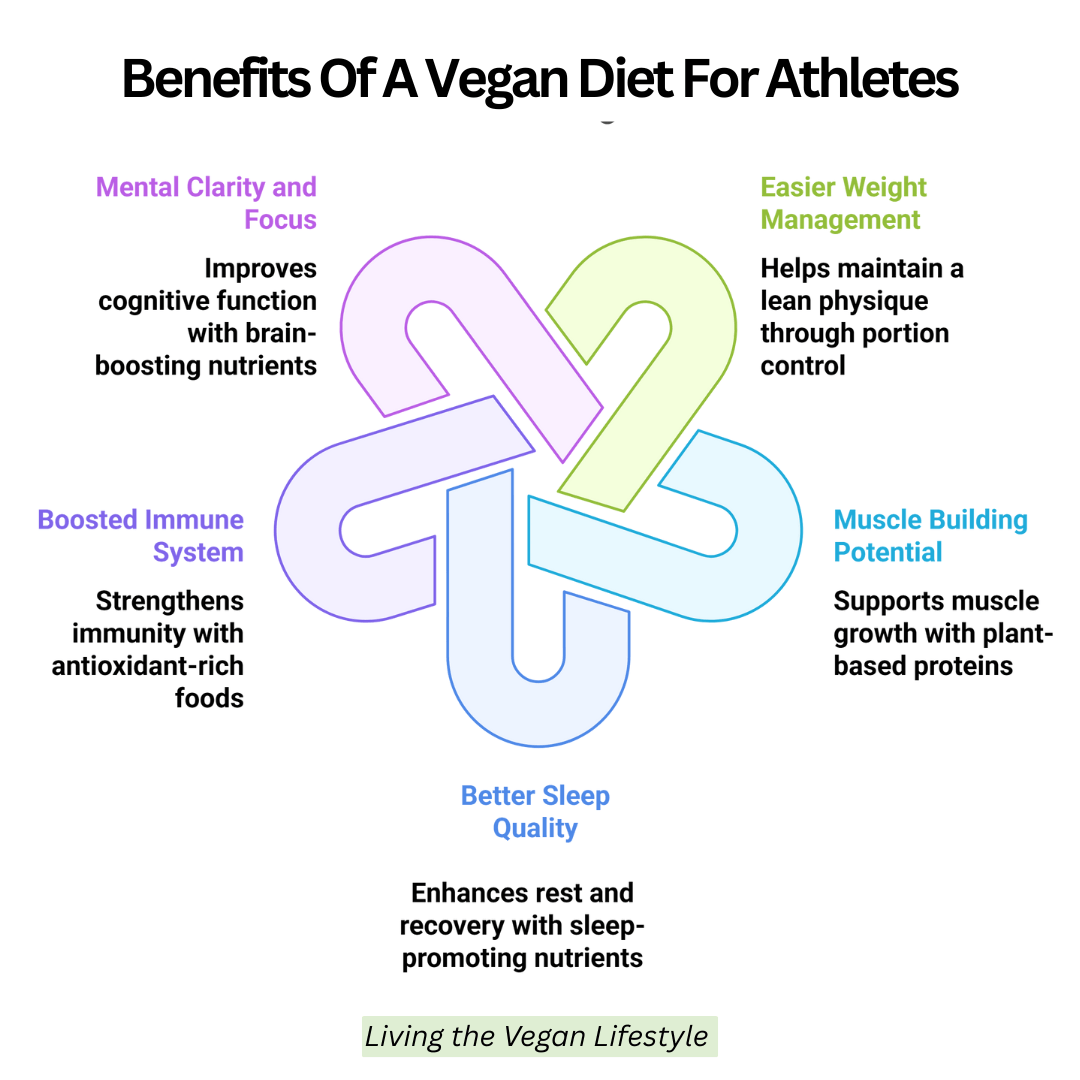
Conclusion
Embracing the benefits of a vegan diet for athletes can lead to enhanced performance, quicker recovery, and long-term health advantages. With the right balance of plant-based foods, athletes can thrive without compromising strength or stamina.
Whether you're training for your next big event or simply aiming for better wellness, a vegan lifestyle offers a powerful, ethical way to fuel your body and mind. The journey starts with every mindful bite.
I trust you enjoyed this article about the Benefits Of A Vegan Diet For Athletes. Please stay tuned for more blog posts to come shortly. Take care!
JeannetteZ
>>> Please click here to read my Vegan Travel Guides To World Destinations <<<
>>> Want To Learn How To Create Delicious, Cruelty-Free, Healthy AND 100% Vegan Meals? Try These Awesome Vegan Cooking Courses With A Free 7-DAY MEMBERSHIP<<<
Your Opinion Is Important To Me
Do you have thoughts, ideas, or questions? I would love to hear from you. Please leave me your questions, experiences, and remarks about this article on the Benefits Of A Vegan Diet For Athletes in the comments section below. You can also reach me by email at Jeannette@LivingTheVeganLifestyle.org.
Disclosure
This post may contain affiliate links. I earn from qualifying purchases as an Amazon Associate and other affiliate programs. Read my full disclosure.
Here are links to some of my favourite articles:
11 Best Vegan Pasta Sauce Recipes For Your Kids
8 Best Vegan Wedding Dessert Recipes
8 Best Vegan Cocoa Recipes For Your Kids
15 Best Vegan Cocktail Recipes
6 Best Vegan Parsnip Recipes For Your Kids


